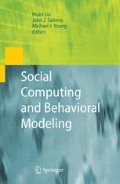Abstract
A process that can be used to assist analysts in developing domain specific Timed Influence Nets (TIN) is presented. The process can be used to represent knowledge about a situation that includes descriptions of cultural behaviors and actions that may influence such behaviors. One of the main challenges in using TINs has been the difficulty in formulating them. Many Subject Matter Experts have difficulty in expressing their knowledge in the TIN representation. The ontology based meta modeling approach described in this paper provides potential assistance to these modelers so that they can quickly create new models for new situations and thus can spend more time doing analysis. The paper describes the theoretic concepts used and a process that leads to an automated TIN generation. A simple example is provided to illustrate the technique.
Access this chapter
Tax calculation will be finalised at checkout
Purchases are for personal use only
Preview
Unable to display preview. Download preview PDF.
References
Wagenhals, L. W. (2000) Course of Action Development and Evaluation Using Discrete Event System Models of Influence Nets. PhD Dissertation, George Mason University, Fairfax, VA.
Wagenhals, L. W. & Levis, A. H. (2000) Course of Action Development and Evaluation. In: Proceedings of the 2000 Command and Control Research and Technology Symposium.
Wagenhals, L. W. & Levis, A. H. (2002) Modeling Support of Effects-Based Operations in War Games. In: Proc. 2002 Command and Control Research and Technology Symposium, Monterey, CA.
Haider, S. & Zaidi, A. K. (2004) Transforming Timed Influence Nets into Time Sliced Bayesian Networks. In: Proceedings of Command and Control Research and Technology Symposium.
Haider, S. & Levis, A. H. (2005) Dynamic Influence Nets: An Extension of Timed Influence Nets for Modeling Dynamic Uncertain Situations. In: Proc. 10th International Command and Control Research and Technology Symposium, Washington DC.
Haider, S., Zaidi, A. K. & Levis, A. H. (2004) A Heuristic Approach for Best Set of Actions Determination in Influence Nets. In: Proc. IEEE International Conference on Information Reuse and Integration, Las Vegas.
Hudson, L. D., Ware, B. S., Mahoney, S. M. & Laskey, K. B. (2001) An Application of Bayesian Networks to Anti-Terrorism Risk Management for Military Planners. Department of Systems Engineering and Operations Research, George Mason University.
SIAM: Influence Net modeler (SIAC), http://www.inet.saic.com/inet-public/siam.htm.
9. Douglas, B. L. (1995). CYC: A Large-Scale Investment in Knowledge Infrastructure. Commun. ACM 3833–38.
Mueller, E. T. (1997). Natural Language Processing with ThoughtTreasure: Signiform.
11. George, A. M. (1995). WordNet: A Lexical Database for English. Commun. ACM 3839–41.
Ding, L., Finin, T., Joshi, A., Pan, R., Cost, R. S., Peng, Y., Reddivari, P., Doshi, V. C. & Sachs, J. (2004) Swoogle: A Search and Metadata Engine for the Semantic Web. In: Proceedings of the Thirteenth ACM Conference on Information and Knowledge Management. ACM Press.
Grosso, W. E., Eriksson, H., Fergerson, R. W., Gennari, J. H., Tu, S. W. & Musen, M. A. (1999) Knowledge Modeling at the Millennium (the design and evolution of protege-2000). In: Proceedings of the Twelfth Workshop on Knowledge Acquisition, Modeling and Management, pp. 16–21.
Kalyanpur, A., Parsia, B., Sirin, E., Grau, B. C. & Hendler, J. (2006). Swoop: A Web Ontology Editing Browser. Web Semantics: Science, Services and Agents on the World Wide Web 4: 144–153.
15. Evren, S.,Bijan, P., Bernardo Cuenca, G., Aditya, K. & Yarden, K. (2007). Pellet: A practical OWL-DL reasoner. Web Semantics: Science, Services and Agents on the World Wide Web 551–53.
Mcguinness, D. L. & van Harmelen, F. (2004) OWL Web Ontology Language Overview. World Wide Web Consortium.
Beckett, D. (2004) RDF/XML Syntax Specification (Revised).
Pythia: Timed Influence Net Modeler, http://sysarch.gmu.edu/main/software/. SAL-GMU.
(2008) SPARQL Query Language for RDF.
Wagenhals, L. W. & Levis, A. H. (2007) Course of Action Analysis in a Cultural Landscape Using Influence Nets. Computational Intelligence in Security and Defense Applications, 2007. CISDA 2007. IEEE Symposium on pp. 116–123)
Author information
Authors and Affiliations
Corresponding author
Rights and permissions
Copyright information
© 2009 Springer-Verlag US
About this paper
Cite this paper
Mansoor, F., Zaidi, A.K., Wagenhals, L., Levis, A.H. (2009). Meta-modeling the Cultural Behavior Using Timed Influence Nets. In: Social Computing and Behavioral Modeling. Springer, Boston, MA. https://doi.org/10.1007/978-1-4419-0056-2_19
Download citation
DOI: https://doi.org/10.1007/978-1-4419-0056-2_19
Published:
Publisher Name: Springer, Boston, MA
Print ISBN: 978-1-4419-0055-5
Online ISBN: 978-1-4419-0056-2
eBook Packages: Computer ScienceComputer Science (R0)

